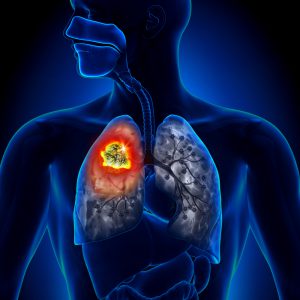NFCR’s Genomics Newsroom: Discovery of New Lung Cancer Mutation
What is “genomics”?
Cancer develops when genetic material (DNA) becomes damaged or changed. We know some cancer causing genetic changes are acquired (i.e. smoking), while others are inherited. Studying cancer genomics explores the differences between cancer cells and normal host cells. Advances in understanding how cancer behaves at a genomic and molecular level is helping doctors treat cancer “smarter”.
More Treatment Options for NSCLC Patients with ROS1+ Gene Mutation

Researchers at University of Colorado Cancer Center have uncovered what they believe to be the cause of this drug resistance: A mutation in the KIT gene, as well as a potential solution. Initial studies show that introducing the drug ponatinib to the treatment regimen may reverse drug resistance, allowing patients to reap the benefits of crizotinib for a longer period of time.
Although further research is needed, this is an important milestone for patients with ROS1+ NSCLC who previously had limited treatment options.
Genomic Testing
While traditional methods treat cancer based on the body part where the cancer first originated, genomic testing looks at cancer on the molecular level.
Genomic testing reveals the unique genomic drivers for each patient’s cancer. This empowers oncologists to design optimal, individualized therapies to maximize treatment success.
To find out if your cancer has ROS1+ or KIT gene mutation, learn more about genomic testing and ask your doctor if it’s right for you.
Related NFCR-Funded Research
A team lead by Dr. Alice Shaw, an NFCR-supported scientist at Massachusetts General Hospital, is developing a new platform that can rapidly identify effective drug combinations for lung cancer patients whose tumors have stopped responding to targeted therapy. The team is growing cells in the laboratory that were taken directly from the patients’ cancer and treating them with a host of different drug combinations to find the ones that work. Dr. Shaw says “this strategy might be used to select the optimal treatment for each individual patient, and could also be applied to other types of cancer.”












